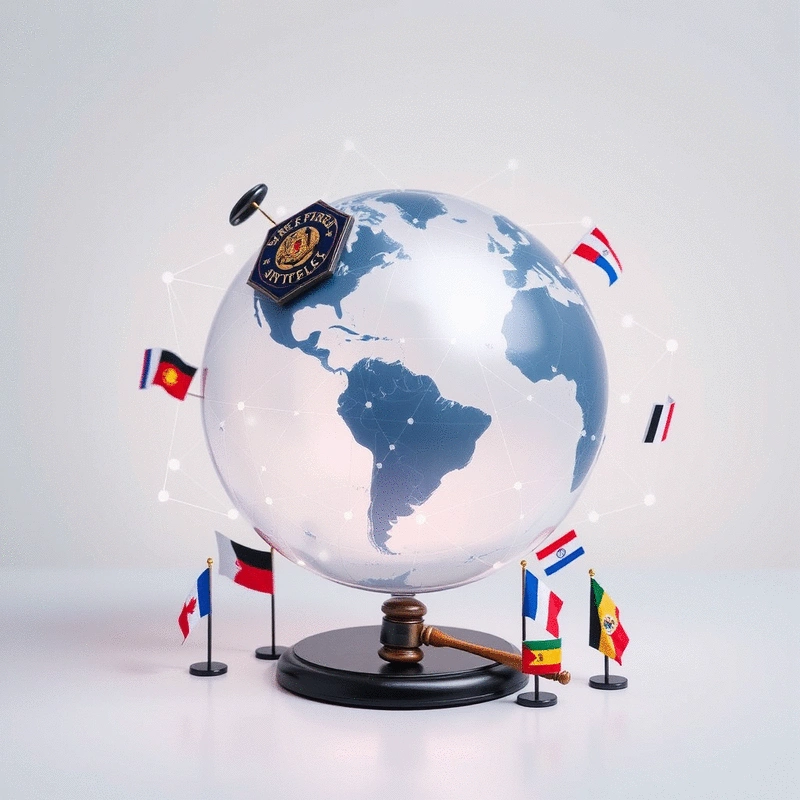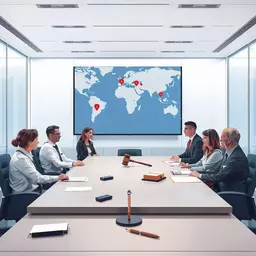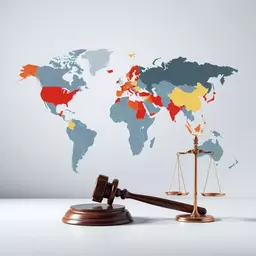Understanding Interpol's Role in Law

The world we live in is increasingly interconnected, and with that comes the complexity of transnational crime. In this landscape, organizations like Interpol play a pivotal role in ensuring global safety and cooperation among law enforcement agencies.
What You Will Learn
- Interpol's primary mission is to enhance global security through international police cooperation and crime prevention.
- Information exchange among member countries is crucial for tackling various criminal activities, from drug trafficking to human trafficking.
- The organization focuses on crime prevention, investigation support, and capacity building to adapt to the evolving landscape of crime.
- Interpol facilitates cooperation through notices, operational support, and swift information sharing among national law enforcement agencies.
- The General Assembly and Executive Committee are key components of Interpol's structure, guiding policies and managing daily operations.
- The General Secretariat implements policies and fosters innovation to keep pace with emerging threats in international crime.
- Future strategies for Interpol will involve enhanced technology integration and strengthened partnerships to address new challenges like cybercrime.
- Collaboration among global law enforcement agencies is essential for creating safer societies and building trust in communities.
Key Components of Interpol's Structure
Understanding Interpol's organizational framework is essential for grasping its effectiveness in managing international law enforcement challenges. Below is a visual representation highlighting the key components and their roles. For more insights into how legal strategies can help in such complex scenarios, consider reading about criminal defense lawyers in Dubai.
General Assembly
The supreme governing body consisting of representatives from all member countries. It meets annually to discuss policies and approve budgetary matters.
Executive Committee
Responsible for the day-to-day management of Interpol, implementing policies and overseeing operations.
National Central Bureaus (NCBs)
Act as communication links for local law enforcement agencies, connecting them with Interpol's global network.
Governing Committees
Focus on specific areas of law enforcement, shaping policies and ensuring alignment with Interpol’s mission.
Understanding Interpol's Role in Global Law Enforcement
Interpol plays a vital role in enhancing global security through its mission of international policing and crime prevention. It connects law enforcement agencies across different jurisdictions, enabling them to work together efficiently. By fostering collaboration, Interpol enhances the ability of countries to address complex transnational crimes that cross borders.
One of Interpol's main objectives is to facilitate information exchange among member countries. This helps law enforcement agencies to tackle various criminal activities—ranging from drug trafficking to human trafficking. By sharing intelligence, Interpol strengthens the collective capability to combat crime on a global scale, allowing countries to be proactive rather than reactive in their approaches to law enforcement.
Defining Interpol's Mission and Purpose
Interpol's mission is centered around creating a safer world by enhancing international police cooperation. This means providing a platform where member countries can share information and resources, thus improving their individual and collective crime-fighting efforts. The emphasis is not only on preventing crime but also on supporting victims and safeguarding communities.
To achieve its goals, Interpol focuses on several key areas:
- Crime Prevention: Developing strategies to prevent criminal activities before they occur.
- Investigation Support: Assisting in criminal investigations by providing timely information and resources.
- Capacity Building: Training law enforcement personnel to enhance their skills and effectiveness.
This comprehensive approach enables Interpol to adapt to the ever-evolving landscape of crime, ensuring a coordinated global response. For those facing challenges related to Interpol notices, understanding how to respond to an Interpol Red Notice is crucial.
Facilitating International Police Cooperation
At the heart of Interpol's operations is its ability to facilitate effective cooperation between national law enforcement agencies. When a crime occurs that affects multiple countries, Interpol steps in to help coordinate responses and investigations. This collaboration builds trust and enhances communication among police forces, which are often crucial in solving complex cases.
Some ways Interpol aids in international police cooperation include:
- Notices: Issuing alerts (like Red Notices) that inform member countries about wanted individuals.
- Operational Support: Providing logistical and operational support during joint operations.
- Information Sharing: Utilizing its secure communications platform to share critical information swiftly.
This cooperative framework allows countries to confront challenges that no single nation could tackle alone, ultimately making the world a safer place.
The Organizational Framework of Interpol
Understanding how Interpol is structured helps to appreciate its effectiveness in managing international law enforcement challenges. Its organizational framework consists of several key components that work in tandem to ensure smooth operations and clear communication.
Among these components, the General Assembly, the Executive Committee, and the National Central Bureaus (NCBs) stand out. Each plays a distinct role in ensuring that Interpol's mission is executed efficiently and effectively.
Key Components of Interpol's Structure
The General Assembly is the supreme governing body of Interpol, consisting of representatives from all member countries. It meets annually to discuss policies and approve budgetary matters. This democratic structure allows for a diverse range of voices and perspectives, ensuring that decisions reflect the needs of all member nations.
The Executive Committee, on the other hand, is responsible for the day-to-day management of Interpol. This body implements policies set by the General Assembly and oversees the organization's operations. Additionally, the National Central Bureaus (NCBs) serve as vital communication hubs for each member country, connecting local law enforcement agencies with Interpol's global network.
- General Assembly: Sets policies and approves budgets.
- Executive Committee: Manages daily operations and implements policies.
- National Central Bureaus (NCBs): Act as communication links for local law enforcement.
This structured approach ensures that Interpol remains responsive and effective in addressing international crime.
Understanding the Role of the General Secretariat
The General Secretariat serves as the executive body of Interpol, implementing the policies decided by the General Assembly. It is responsible for the overall administration and operational support of the organization. This includes managing resources, conducting research, and coordinating with member countries to enhance their law enforcement capabilities.
Furthermore, the General Secretariat plays a critical role in fostering innovation within Interpol. By developing new strategies and technologies, it ensures that the organization adapts to the changing landscape of crime. This forward-thinking approach is essential for keeping pace with emerging threats and challenges in the international arena. For more details on this, you might find our article on Interpol Red Notices and Extradition insightful.
INTERPOL’s Governing Bodies and Their Functions
Interpol's governing bodies are integral to its decision-making processes. Besides the General Assembly and Executive Committee, there are various other committees that focus on specific areas of law enforcement. These bodies help shape Interpol's policies and ensure that they align with the organization’s mission.
The collaboration among these governing bodies promotes transparency and accountability within Interpol, which is crucial for maintaining trust between member countries. By engaging in regular discussions and evaluations, they ensure that Interpol's strategies are effective and relevant.
- Committees: Address specific law enforcement areas.
- Policy Development: Shape the future direction of Interpol.
- Performance Evaluations: Ensure accountability and effectiveness.
This structured governance is key to maintaining Interpol's integrity and effectiveness in international policing.
Quick Summary
Here's a brief recap of the key points discussed so far:
- Interpol enhances global security by facilitating international police cooperation.
- It plays a critical role in information exchange to combat transnational crimes.
- The organizational framework includes the General Assembly, Executive Committee, and National Central Bureaus, each crucial for effective operations.
Frequently Asked Questions About Interpol
- What is Interpol's primary mission?
- Interpol's primary mission is to enhance global security through international police cooperation and crime prevention by connecting law enforcement agencies worldwide.
- How does Interpol facilitate information exchange?
- Interpol facilitates information exchange among member countries through its secure communications platform, enabling swift sharing of critical data to combat various transnational criminal activities.
- What are the key components of Interpol's structure?
- The key components of Interpol's structure include the General Assembly (supreme governing body), the Executive Committee (day-to-day management), and National Central Bureaus (NCBs) which act as communication links for local law enforcement.
- What are Interpol Notices?
- Interpol Notices are international alerts (like Red Notices) issued to inform member countries about wanted individuals or to share information about criminals and criminal activities.
- How does Interpol adapt to new crime challenges like cybercrime?
- Interpol adapts to new crime challenges by fostering innovation, developing new strategies and technologies (like AI and big data analytics), and strengthening global partnerships to address emerging threats.
Summarizing Interpol's Essential Contributions to Law Enforcement
As we reflect on Interpol's critical role, it’s clear that the organization serves as a backbone for global policing. By promoting international cooperation, Interpol tackles transnational crimes that often defy borders. Whether it’s combating terrorism or addressing human trafficking, their impact is profound and vital.
Interpol not only facilitates communication among law enforcement agencies but also creates a network of resources that empower nations to act decisively against crime. This collaborative approach is essential for effective policing in today’s interconnected world. With each initiative, they demonstrate the importance of unity in fighting crime on a global scale.
Future Outlook for Interpol and International Policing
Looking ahead, Interpol will need to navigate an evolving landscape filled with new challenges. The rise of cybercrime, for example, presents unique hurdles that require innovative solutions. As I share insights on this, it’s evident that both technology and collaboration will be crucial in shaping Interpol's strategies.
Here are a few key considerations for the future:
- Enhanced Technology Integration: Adapting to new tools like AI and big data analytics to improve operations.
- Strengthened Global Partnerships: Building stronger relationships with member countries and private sectors to share intelligence.
- Focus on Emerging Crimes: Addressing threats like environmental crime and human trafficking more effectively.
As we consider these future directions, it’s important to remember that each step taken by Interpol can have ripple effects across jurisdictions, helping to create safer societies.
Encouraging International Collaboration for Safer Societies
Ultimately, the call for cooperation among law enforcement agencies worldwide cannot be overstated. By working together, we create a collective strength that enhances security and promotes justice. As individuals engaged in international law and extradition, like myself at Extradition Interpol UAE, we recognize the power of shared knowledge and resources. For a deeper understanding of the legal frameworks involved, explore extradition laws in the UAE.
Through collaboration, we can not only combat crime more effectively but also build trust and relationships that foster peace and safety in our communities. Let’s remain committed to supporting Interpol’s mission and encouraging open lines of communication among law enforcement agencies globally. Moreover, for those seeking to understand the intricacies of such legal processes, a key resource is our guide on extradition: navigating legal cooperation.
Accessing Additional Resources and Information
For those interested in diving deeper into Interpol's work and initiatives, I encourage you to explore the following resources:
- INTERPOL Crime Pages - Details on specific crime categories and initiatives.
- Criminal Organizations Overview - Insight into the organizations that Interpol combats.
- About INTERPOL - Learn more about Interpol's mission and vision.
These resources can help anyone stay informed about global policing efforts and strengthen their understanding of how we can all contribute to a safer world.
Recap of Key Points
Here is a quick recap of the important points discussed in the article:
- Role of Interpol: Interpol enhances global security by facilitating international policing and crime prevention through collaboration among member countries.
- Information Exchange: It plays a crucial role in sharing intelligence to tackle transnational crimes such as drug and human trafficking.
- Cooperation Framework: Interpol coordinates responses to crimes that affect multiple nations, building trust and enhancing communication among law enforcement agencies.
- Organizational Structure: Key components include the General Assembly, Executive Committee, and National Central Bureaus, each contributing to efficient operations.
- Future Challenges: Interpol must adapt to emerging threats like cybercrime, emphasizing the need for enhanced technology integration and global partnerships.
- Commitment to Collaboration: Ongoing international cooperation is essential for combating crime effectively and fostering safer societies.



